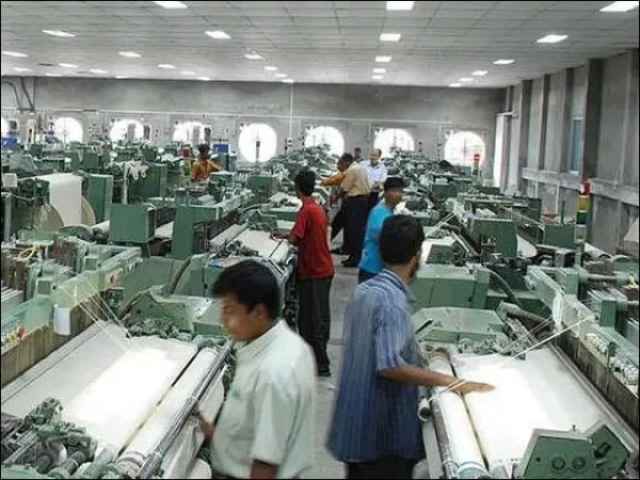Islamabad:
Pakistan Textile Council (PTC) raised concerns on Friday over the significant decrease in exports and closure of industries.
According to a statement from the council, exports fell by 3.83% in the first quarter of the current financial year, totaling $ 7.61 billion. In September alone, exports fell sharply by 11.71%, equivalent to $ 2.51 billion.
The PTC also noted that the trade deficit has been expanded to $ 9.37 billion in the same quarter, largely due to an increase of 13.49% in imports, which puts considerable pressure on the country’s external accounts.
As a result of these financial challenges, Gul Ahmed Textile has decided to close its export cladding segment, which affects thousands of workers, observed PTC.
Several major multinational companies, including Procter & Gamble, Microsoft and Shell, have either left Pakistan or reduced their operations significantly. PTC cited rising energy costs, heavy taxation and uncertainty about policy as key factors that make these decisions.
The Council urged the government to implement immediate reforms and warned that without rapid action more industries could shut down and investments could continue to fall.
PTC President Fawad Anwar emphasized the need to provide regionally competitive energy rates for export industries, improve tax policies and streamline the reimbursement system to support the export sector. He warned that without these measures, the country risks further contraction in exports, which would adversely affect the economy.
PTC previously criticized the Federal Board of Revenue’s (FBR) recent changes to Export Facilitation Scheme (EFS), warning that the changes pose a direct threat to the survival of the country’s textile and clothing exports.
Read: Textile sector seeking political interventions
PTC, which accounts for over 30% of the country’s textile and clothing exports, submitted a formal set of objections and recommendations to FBR in response to SRO 1359 (1)/2025 dated July 29, 2025.
PTC’s submission, in line with the five-day window delivered to feedback, strongly criticized the recent changes to EFS and warned that the changes could paralyze Pakistan’s value-added export sector at a time of increased global economic uncertainty.
It emphasized that EFS ensures competitiveness for textile and clothing exporters. The changes not only overlooked recommendations from a high -level government committee, led by Planning Minister Ahsan Iqbal, but also introduced restrictive and impractical conditions that threaten the sector’s survival.
One of the most harmful provisions, according to the PTC, is the exclusion of cotton, cotton yarn and gray cloth from the EFS use area. “This clause must be withdrawn immediately,” the council said as it was never agreed that these materials would be excluded. At most, a refundable general VAT (GST) was on cotton yarn over a particular count during discussion. “Their removal of rugs from the scheme is unjustified and financially reckless.”
Anwar called the relocation of a “tax on exports” and said it would impose a serious financial burden for exporters already struggling with global protectionism, rising input costs and new trading barriers, including the recently imposed mutual tasks from the United States. “The timing couldn’t be worse. Exportors are under stress, and instead of supporting them, the government is pushing policies that increase costs and complicating operations,” he said.
PTC’s political note recommended that the input utilization period remain 18 months with the possibility of a six-month extension of the legislative authority. Any extension beyond this should be subject to the approval of an FBR-appointed committee. In addition, the Council proposes that unused input materials should be allowed to be led until the following year after submitting a declaration of reconciliation.
Read more: Textile policy to make the industry competitive
The authorization mechanism for entry purchases should be more flexible. For new EFS users, the regulatory authority can approve preliminary authorization up to 50% of the alleged production capacity, with the rest assigned by capacity verification of input output -coefficient organization (IOCO).
The Council urged FBR to switch from bank guarantees to insurance guarantees and noted that the latter would significantly reduce the burden of compliance and financial stress for exporters. It highlighted the operational impractical of new supplier restrictions in toll.
According to the current change, goods sent for treatment outside treatment must be returned within 60 days, supplier information must be pre-raised, and any subsequent changes require prior Collectorate approval. The PTC claimed that these requirements are unnecessarily stiff and interfere with operational flexibility and negotiations with subcontractors. It called for the removal of excessive data requirements, such as vehicle numbers, and called for the extension of the bombing production duration.
The Council rejected the proposed rule that required physical sampling to verify the use of imported input. It called for the reintroduction of the original exam -labeled sampling provisions, stressing that the new rule would delay exports and create bottlenecks in the verification process. Finally and most critically, PTC demanded the immediate reversal of the exclusion of cotton, cotton yarn and gray cloth from EFS. These materials are fundamental to the textile value chain, and excluding them will force exporters to carry advance import duties and taxes despite being net currency treatments.



